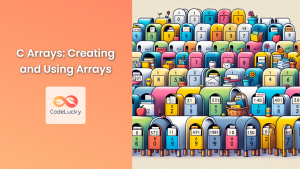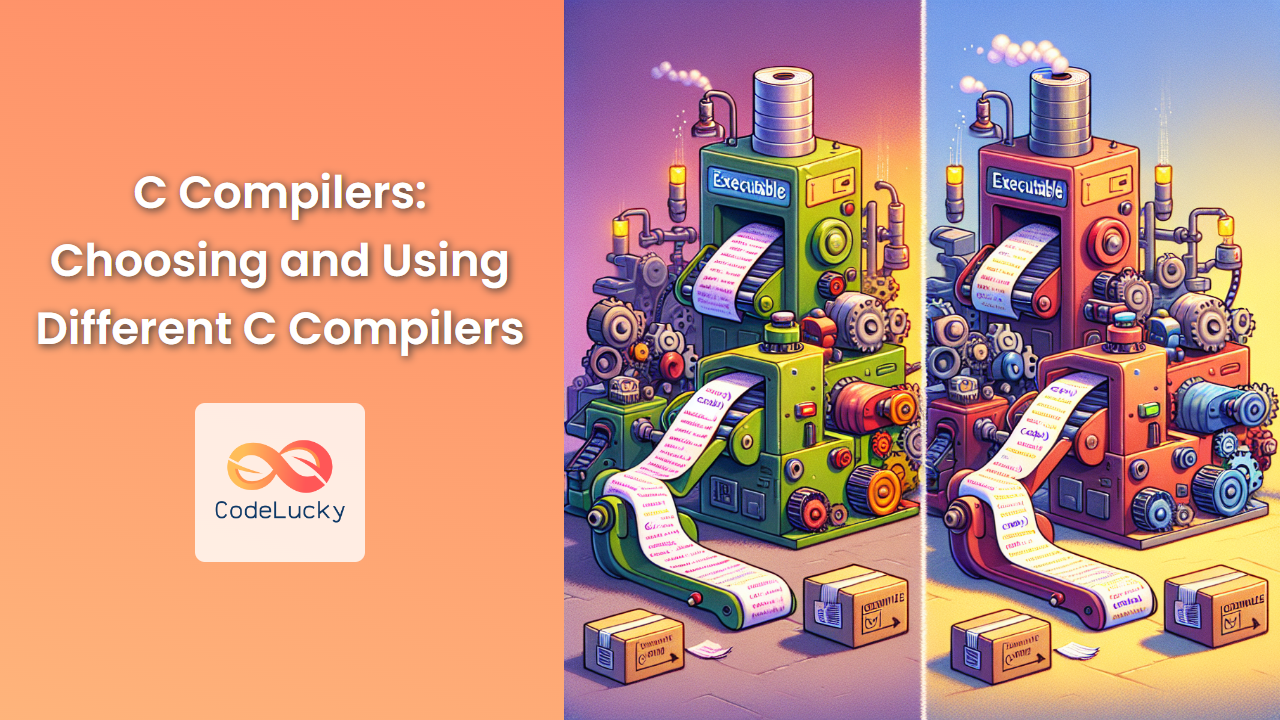Memory management is a crucial aspect of C programming that every developer must master. In this comprehensive guide, we'll dive deep into dynamic memory allocation using malloc() and free() functions. These powerful tools allow you to allocate memory at runtime, giving your programs flexibility and efficiency.
Understanding Static vs. Dynamic Memory Allocation
Before we delve into dynamic memory allocation, let's briefly compare it with static allocation:
🏠 Static Allocation:
- Memory is allocated at compile time
- Size is fixed and cannot change during runtime
- Typically used for local variables and global variables
🚀 Dynamic Allocation:
- Memory is allocated at runtime
- Size can be determined based on user input or program needs
- Allows for more flexible and efficient use of memory
Introduction to malloc()
The malloc() function is a cornerstone of dynamic memory allocation in C. It stands for "memory allocation" and is used to request a block of memory from the heap.
Syntax of malloc()
void* malloc(size_t size);
size: The number of bytes to allocate- Returns a void pointer to the allocated memory, or NULL if the allocation fails
Let's look at a simple example:
#include <stdio.h>
#include <stdlib.h>
int main() {
int *ptr;
ptr = (int*) malloc(sizeof(int));
if (ptr == NULL) {
printf("Memory allocation failed\n");
return 1;
}
*ptr = 42;
printf("Value stored: %d\n", *ptr);
free(ptr);
return 0;
}
In this example:
- We declare a pointer to an integer.
- We use
malloc()to allocate memory for one integer. - We check if the allocation was successful.
- We store the value 42 in the allocated memory.
- We print the stored value.
- Finally, we free the allocated memory.
Output:
Value stored: 42
Allocating Arrays with malloc()
One of the most common uses of malloc() is to create dynamic arrays. Let's see how we can allocate an array of integers:
#include <stdio.h>
#include <stdlib.h>
int main() {
int *arr;
int n = 5;
arr = (int*) malloc(n * sizeof(int));
if (arr == NULL) {
printf("Memory allocation failed\n");
return 1;
}
for (int i = 0; i < n; i++) {
arr[i] = i * 10;
}
printf("Array elements: ");
for (int i = 0; i < n; i++) {
printf("%d ", arr[i]);
}
printf("\n");
free(arr);
return 0;
}
Output:
Array elements: 0 10 20 30 40
In this example, we allocate memory for an array of 5 integers, fill it with values, and then print those values.
The Importance of Free()
The free() function is just as important as malloc(). It's used to deallocate memory that was previously allocated by malloc(), calloc(), or realloc().
Syntax of free()
void free(void* ptr);
ptr: Pointer to the memory previously allocated bymalloc(),calloc(), orrealloc()
Memory Leaks
Failing to free allocated memory can lead to memory leaks. Let's look at an example:
#include <stdio.h>
#include <stdlib.h>
void memory_leak() {
int *ptr = (int*) malloc(sizeof(int));
*ptr = 42;
printf("Value: %d\n", *ptr);
// Oops! We forgot to free(ptr)
}
int main() {
for (int i = 0; i < 1000000; i++) {
memory_leak();
}
return 0;
}
This program allocates memory in a loop but never frees it. Over time, this can consume all available memory, causing the program to crash or slow down the system.
Advanced malloc() Techniques
Resizing Allocated Memory with realloc()
Sometimes, you might need to change the size of previously allocated memory. The realloc() function allows you to do this:
#include <stdio.h>
#include <stdlib.h>
int main() {
int *numbers = (int*) malloc(5 * sizeof(int));
if (numbers == NULL) {
printf("Initial allocation failed\n");
return 1;
}
for (int i = 0; i < 5; i++) {
numbers[i] = i + 1;
}
printf("Initial array: ");
for (int i = 0; i < 5; i++) {
printf("%d ", numbers[i]);
}
printf("\n");
// Resize the array to hold 10 integers
numbers = (int*) realloc(numbers, 10 * sizeof(int));
if (numbers == NULL) {
printf("Reallocation failed\n");
return 1;
}
// Fill the new elements
for (int i = 5; i < 10; i++) {
numbers[i] = i + 1;
}
printf("Resized array: ");
for (int i = 0; i < 10; i++) {
printf("%d ", numbers[i]);
}
printf("\n");
free(numbers);
return 0;
}
Output:
Initial array: 1 2 3 4 5
Resized array: 1 2 3 4 5 6 7 8 9 10
Allocating 2D Arrays
Allocating multi-dimensional arrays dynamically requires a bit more work. Here's how you can allocate a 2D array:
#include <stdio.h>
#include <stdlib.h>
int main() {
int rows = 3, cols = 4;
int **matrix;
// Allocate memory for rows
matrix = (int**) malloc(rows * sizeof(int*));
if (matrix == NULL) {
printf("Memory allocation failed\n");
return 1;
}
// Allocate memory for columns of each row
for (int i = 0; i < rows; i++) {
matrix[i] = (int*) malloc(cols * sizeof(int));
if (matrix[i] == NULL) {
printf("Memory allocation failed for row %d\n", i);
// Free previously allocated memory
for (int j = 0; j < i; j++) {
free(matrix[j]);
}
free(matrix);
return 1;
}
}
// Initialize the matrix
for (int i = 0; i < rows; i++) {
for (int j = 0; j < cols; j++) {
matrix[i][j] = i * cols + j + 1;
}
}
// Print the matrix
printf("2D Array:\n");
for (int i = 0; i < rows; i++) {
for (int j = 0; j < cols; j++) {
printf("%2d ", matrix[i][j]);
}
printf("\n");
}
// Free the allocated memory
for (int i = 0; i < rows; i++) {
free(matrix[i]);
}
free(matrix);
return 0;
}
Output:
2D Array:
1 2 3 4
5 6 7 8
9 10 11 12
Common Pitfalls and Best Practices
1. Always Check for NULL
Always check if malloc() returns NULL to handle allocation failures gracefully:
int *ptr = (int*) malloc(sizeof(int));
if (ptr == NULL) {
// Handle allocation failure
return 1;
}
2. Don't Forget to Free
Always free dynamically allocated memory when it's no longer needed:
int *ptr = (int*) malloc(sizeof(int));
// Use ptr...
free(ptr);
ptr = NULL; // Set to NULL after freeing
3. Avoid Double Free
Freeing memory that has already been freed can lead to undefined behavior:
int *ptr = (int*) malloc(sizeof(int));
free(ptr);
// Don't do this:
// free(ptr); // Double free!
4. Watch Out for Memory Fragmentation
Frequent allocations and deallocations can lead to memory fragmentation. Consider using memory pools for small, frequently allocated objects.
5. Use Valgrind for Memory Debugging
Valgrind is an excellent tool for detecting memory leaks and other memory-related issues:
valgrind --leak-check=full ./your_program
Conclusion
Dynamic memory allocation with malloc() and free() is a powerful feature of C that allows for flexible and efficient memory management. By mastering these functions and understanding their intricacies, you can write more robust and memory-efficient C programs.
Remember:
- Always check for allocation failures
- Free memory when it's no longer needed
- Be mindful of memory leaks and fragmentation
- Use tools like Valgrind to catch memory-related issues
With these skills and best practices, you're well-equipped to tackle complex memory management challenges in your C programming journey. Happy coding! 🚀💻



















